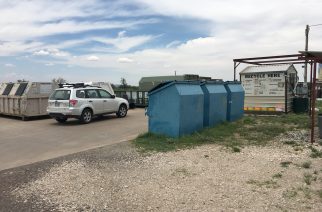via Betsy Evans, Sustainability Council Secretary
Survey data from the SRSU First Annual Sustainability Survey indicated that several Alpine faculty, staff, and students regularly deliver recyclables from their department or office to our local Hal Flanders Recycling Center, but it is true that Sul Ross State University does not have an official recycling program at any SRSU campus. (I will optimistically interject “yet,” here, because I’m an optimist.)

But why not yet? Well, recycling is hard — and confusing. And to confuse you further, it isn’t that Sul Ross doesn’t recycle at all. We do, in fact, house dumpsters specifically for cardboard (behind the University Center). The cardboard is picked up and recycled by our waste management contractor. Our Physical Plant staff also collects paper* in blue bins that is gathered and delivered to Hal Flanders Recycling Center on an as-needed basis. So we do officially recycle. Except for the innumerable aluminum cans, plastic bottles, and other plastics that go into our landfill dumpsters every day.
Rather than get into all the specific logistics that must be addressed before an official recycling plan can be implemented on any SRSU campus (because there are many), I think for now I will share a recent story by National Public Radio about plastics recycling. The interactive website created by NPR helps to define some of the challenges with recycling plastics. Recycling is not a one-size-fits-all kind of business, and this information about plastics — the ones many of us see and use every day — provides a handy metaphor for the recycling business as a whole. The ability to recycle something differs by geography, material, market, machine-availability, and many other factors. These are all factors that Sul Ross must take into consideration before and during the implementation of a recycling program.
It’s important to note here that (as of the publication of this post) Alpine’s local Hal Flanders Recycling Center accepts only CLEAN plastics labeled with a 1 or a 2 (without their lids, because lids are often made of more rigid plastics) as well as stretchy film plastic and plastic red cups. (The red cups go to our local 4H Chapter.)
Learning more about the challenges of recycling may make you feel like recycling is a lost cause. I don’t believe it to be a lost cause, but I do believe there is a reason it is the last “R” in those oft-recited “three R’s” (reduce, reuse, recycle). If you want to be involved in the discussion about developing a more robust recycling program on the Alpine campus or any other Sul Ross campus, please get in touch. If you want to challenge yourself to reduce the amount of waste you create on campus and at home, do that too. Then, when “yet” comes, you’ll be even more ready.
*But please only put mixed paper, sans staples, in the blue bins unless your department has a specific grassroots recycling program in place. Our Physical Plant staff is only in charge of recycling mixed paper with the blue bins, and contaminating the mixed paper can pose negative effects on recycling for the entire Hal Flanders Recycling Center.
